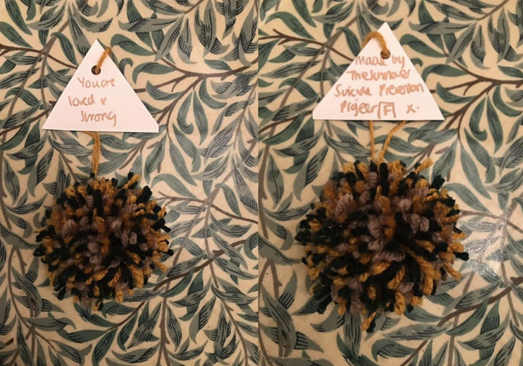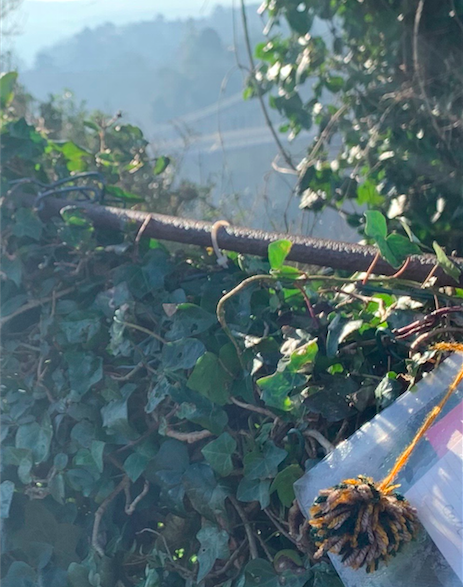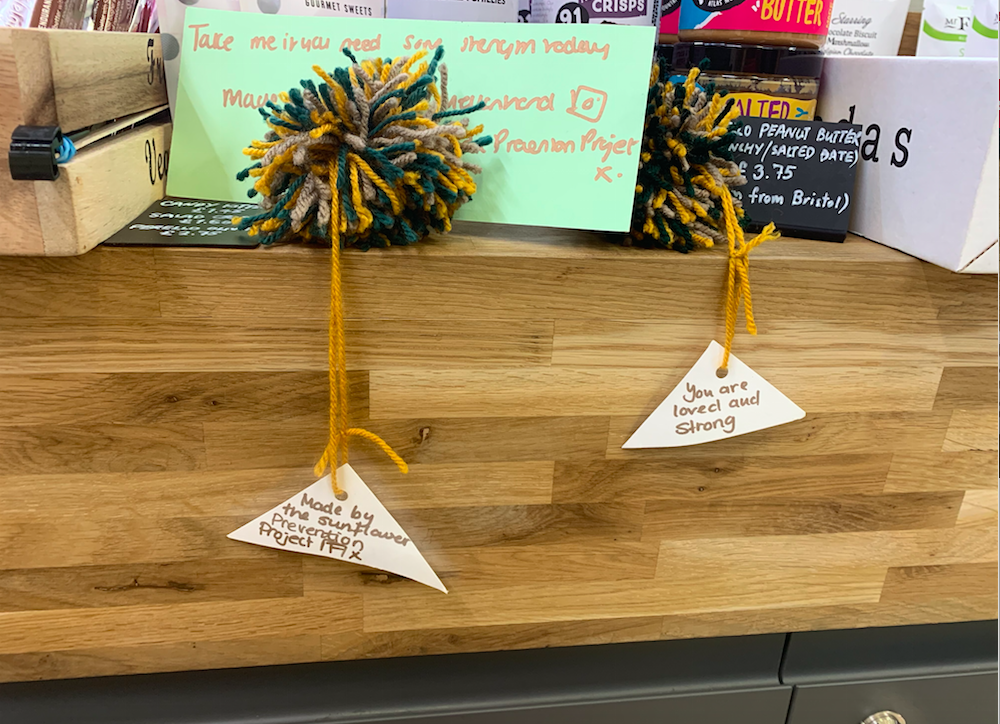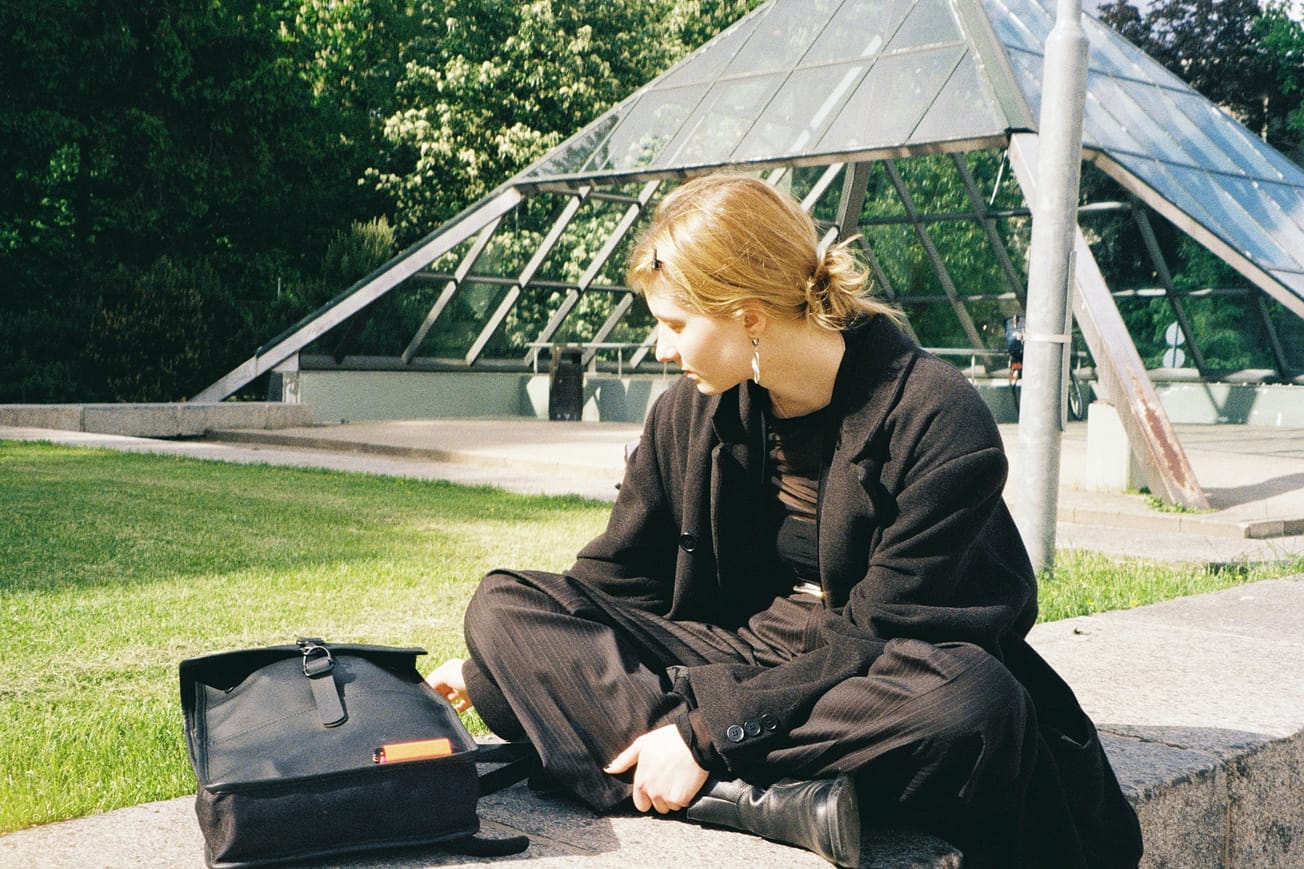By Geesue Abrichami, First Year, Anthropology
The Croft Magazine // The founder of the Sunflower Suicide Prevention Project relates her story and tells us how her mental health craft project has spread around the city.
Content warning: this article contains references to suicide.
As I interview Loo, it is hard to believe that her mental health hit rock bottom only two years ago. In April 2018, during her second year of Law School at the University of Bristol, she had a mental breakdown in 'that period prior to approaching coursework, exams, what I call like a pinchpoint period. So I didn't actually finish my law degree but academically, on paper, I was doing really well. But as a person, as a whole human being, I really wasn’t.'
Having been through it herself, Loo appreciates that mental health struggles manifest themselves in different ways and at various times: 'I think with mental health it is a very nuanced personal thing and no one size fits all, so I wouldn't say it was obvious slash black and white, but I think that's the point, it never is. And I think until you check in with yourself do you actually realise sometimes how unwell you might be. So at that time I didn't really know, I didn't really have that full connection with myself.'
Throughout the interview, Loo’s deepened connection with herself continuously shines through. She actually explains that a lack of personal awareness is a real factor in the deterioration of mental health amongst university students today: 'I think university is a very lonely experience.'
Interestingly, the loneliness that Loo refers to is not that of being physically isolated, but something much more personal and internal. 'When I say lonely, a lot of people misinterpret loneliness as it being around people, but sometimes you can be around people and feel the most lonely you've ever felt… so loneliness has two proms, loneliness is connection with yourself and also connection with your wider life.'
'So connection with yourself – not enough people know how they work. They don't have that sort of inward emotional intelligence with themselves, so they know for example if they do x, y and z they may burn out so they need to take a step back. Or they don’t know maybe what things that they enjoy as a person, so I suppose understanding yourself. There's that aspect to loneliness. And then, when you feel that you’re more together as a person, then you can connect to your wider life, so this is where other people come in.'
Despite her own struggle, Loo has rebuilt herself with full force. Not only this, but she has taken a hands-on approach to helping others who struggle with their mental health. Loo emphasises how she has realised that to advocate for mental health and to help others does not mean that she has to be perfect herself, and that sharing vulnerability is in itself a form of help: 'I realised that actually mental health is really not linear, and working in mental health doesn't mean that you have to be perfect, and the power of vulnerability, of actually saying you struggle still, because you are a human, actually is the most compassionate thing you can do for yourself but also to people.'
| Where is the support for student-led talk groups?
Loo’s most notable project is the Sunflower Suicide Prevention Project, where sunflower coloured hand-made pom poms with attached grounding and in the moment quotes are made and scattered all around Bristol, South Gloucestershire and North Somerset. Within the project, individuals have the option of making pom poms in Mental Health Sunflower Solidarity Workshops, so both the making and the receiving of pom poms are part of this cycle of help.

On each of these pom poms reads the message you are loved and strong x. 'These two adjectives are really powerful and it's a reminder that you personally are loved by yourself, but also by others that have made it and by people within your life, and if you feel lonely and maybe haven't got support, the people who have made that pom pom are inadvertently saying 'we do love you' because we've taken the time to make it, and then the strength is like that kind of get up and power through approach and taking it day by day.'
What is so unique about Loo’s project is how prevention-centred it is. A pom pom will not necessarily be sought after, but someone may just stumble upon it, no matter what mental state they may be in, and this is a point that Loo is actively trying to make. 'For me, even if you're not struggling now, how do you know you're not gonna struggle? And that's the point with mental health, it's not linear. They're [the pom poms] not exclusive for when you are in crisis, or when you are in a healthy place. Everyone should have one really, should you need it, when you need it. It could be an hour of a day you may need that pom pom, it could be every single day where you're at now. But that's the point with mental health, no day is ever the same.'
| Battle plans against the body and mind
The Sunflower Suicide Prevention project is not only aimed at helping students, however Loo explains how students have a very close place in her heart due to her own experience. It is for this reason that whether on a night out clubbing, at bus stops, around the libraries, the gym, the pom poms are within the reach of students all over campus.
it's kind of a funky way of saying that mental health is so individualistic
The project is succeeding in forming a community of people going through the same thing, no matter their age or background, and Loo is proud of the sense of togetherness this brings. 'When you can't have hope within yourself, you may need to find it from somebody else, and with time, that hope kind of filters into you… that gives you that kind of fire in your belly that you can keep going.'

With over 200 people being part of the project now, it has become more diverse and special than ever. ‘The difference in sizes of these problems are incredible, and I think it actually sends a wider message of how mental health is so different for individuals. So some pom poms are really thick, some are really small and spidery. But that's the beauty of them, that no mind is exactly the same as other people, so in a way it's kind of like a funky way of saying that mental health is so individualistic.’
The sunflower symbol has been carefully chosen by Loo, and she explains that this flower actually encapsulates what the mental health landscape needs to embody. Cross culturally, sunflowers are a marker of 'lasting happiness and longevity', which represents 'sustainable mental health' to Loo: 'So, there's one thing having a healthy mind, but is it a sustainable healthy mind? Because life is not easy, there's always gonna be difficult patches, but if you can sustainably look after your mental health, that is what good mental health is about as far as I'm concerned.'
The idea is that you might look at it every single day, and you might think actually today I am ready
'You've also got the abundance of the seeds as well, what they produce, so this is where nourishment comes in so kind of connecting with yourself. But as far as I'm concerned, if you can produce seeds then you can pass them onto other people, so this is where togetherness comes… passing on that knowledge and experience… and they [sunflowers] normally grow in fields together.' And, of course, the yellow is a symbol of happiness.
Despite the vibrant colours of the pom poms, they actually stand for a gentler conversation about mental health, the first step for those who aren’t ready to speak openly about their struggles yet: 'By receiving that pom pom, you know that someone's made it, also, you know there's the note on there that 'you are loved and strong' and should you wish to join in in the project, in the sense connecting with us and making it, or workshops, or using the directory of further services, you've got that choice. But only when you’re ready. And the idea is if you hang that up say in your room, you might look at it every single day, and you might think actually today I am ready.'
At the same time, Loo offers many platforms for conversation once people are ready. In fact, another element of the Sunflower Suicide Prevention Project is the Mental Health Sunflower Solidarity Workshops & Mental Health Sunflower Self-Compassion Workshops, where, every Wednesday evening people ground themselves whilst making the sunflower pom poms over a hot drink and cake, talk openly about mental health and have the opportunity to become part of the #bemoresunflower movement by swapping a self care item. This style of conversation is extremely valuable because, as Loo says, 'the power of the story can go such a long way.'
'When you see someone where you’re like I can see a bit of me in them or them in me, that's when you feel okay to talk openly. And then you meet other people that are like you and then it's a snowball effect so I think the more voices the better.'
This element of being bold and vulnerable has openly been displayed by Loo herself, most notably in recent times: she has decided to go into 2020 using her own name within her advocacy: 'Over Christmas I again reflected, journaled and checked in with myself and thought actually now is the time to openly say I am Loo Fletcher, and I am the Sunflower Gal, in the sense of being the face of a subject that is not always spoken about.'
Congratulate yourself for being here in this moment and for the fact that you are still here despite not having the grade you want or as many friends as you want
As for Loo’s advice for university students who are struggling with their mental health, she has a clear message: 'I would say pause. Literally pause, full stop. My pause will be different to your pause. But a pause of how you feel right now in the moment, a pause of being mindful of where you want to go, mindful of where you have come from, your journey. A pause of feeling mindful and of where you want to go. And pause in the sense of congratulating yourself for being here in this moment, because life is not easy, and the fact that you are still here despite not having the grade you want or as many friends as you want, it doesn’t matter because life is so precious… Pause and think where are you now and does your day look like you want it to look and what can you actively do, small steps though, to make it reflect how you want it to be.'
It is safe to say that Loo is helping change the face of mental health in powerful steps, in Bristol and beyond. If you would like to talk to her and/or get involved, you can find information on her website and tickets for events on Eventbrite and Wriggle.
Here are some useful resources if you're struggling:
Featured image: Epigram / Geesue Abrichami
Find The Croft Magazine inside every copy of Epigram newspaper.









